Supplementary/Story | By Yann Martel - Life of Pi | 12th English : UNIT 2 : Supplementary/Story : Life of Pi
Chapter: 12th English : UNIT 2 : Supplementary/Story : Life of Pi
Life of Pi
Supplementary
Life of Pi
Yann Martel
Here is an abridged version of the famous Canadian fantasy adventure novel titled Life of Pi by Yann Martel published in 2001. The protagonist is Piscine Molitor "Pi" Patel, an Indian boy from Pondicherry. He survives 227 days after a shipwreck while stranded on a lifeboat in the Pacific Ocean with a Bengal tiger named Richard Parker.
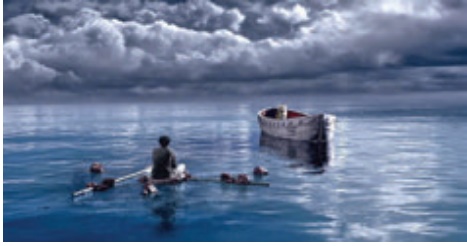
I was alone and orphaned, in the middle of the Pacific, hanging on to an oar, an adult tiger in front of me, sharks beneath me, a storm raging about me. Had I considered my prospects in the light of reason, I surely would have given up and let go of the oar, hoping that I might drown before being eaten. But I don’t recall that had a single thought during those first minutes of relative safety. I didn’t even notice daybreak. I held on to the oar, I just held on, God only knows why?
The elements allowed me to go on living. The lifeboat did not sink. Richard Parker kept out of sight. The sharks prowled but did not attack. The waves splashed me but did not pull me off. I watched the ship as it disappeared with much burbling and belching. Lights flickered and went out. Ilooked about for my family, for survivors, for another lifeboat, for anything that might bring me hope. There was nothing. Only rain, marauding waves of black ocean and the flotsam of tragedy. The darkness melted away from the sky. The rain stopped, I could not stay in the position I was in forever. I was cold. My neck was sore from holding up my head and from all the craning I had been doing. My back hurt from leaning against the lifebuoy. And I needed to be higher up if I were to see other lifeboats.
In the morning I could not move. I was pinned by weakness to the tarpaulin. Even thinking was exhausting. I applied myself to thinking straight. At length, as slowly as a caravan of camels crossing a desert, some thoughts came together.
I thought of sustenance for the first time. I had not had a drop to drink or a bite to eat or a minute of sleep in three days. Finding this obvious explanation for my weakness brought me a little strength.
Richard Parker was still on board. In fact, he was directly beneath me. Incredible that such a thing should need consent to be true, but it was only after much deliberation, upon assessing various mental items and points of view, that I concluded that it was not a dream or a delusion or a misplaced memory or a fancy or any other such falsity, but a solid, true thing witnessed while in a weakened, highly agitated state. The truth of it would be confirmed as soon as I felt well enough to investigate. How I had failed to notice for two–and–a half days a 450-pound Bengal tiger in a lifeboat twenty -six feet long was a conundrum I would have to try to solve later, when I had more energy. The feat surely made Richard Parker the largest stowaway, proportionally speaking, in the history of navigation. From tip of nose to tip of tail he took up over a third of the length of the ship he was on.
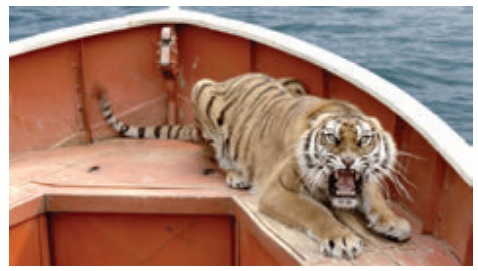
You might think I lost all hope at that point. I did. And as a result I perked up and felt much better. We see that in sports all the time, don’t we? The tennis challenger starts strong but soon loses confidence in his playing. The champion racks up the games. But in the final set, when the challenger has nothing left to lose, he becomes relaxed again, insouciant, daring. Suddenly he’s playing like the devil and the champion must work hard to get those last points. So it was with me. To cope with a hyena seemed remotely possible, but I was so obviously outmatched by Richard Parker that it wasn’t even worth worrying about. With a tiger aboard, my life was over. That being settled, why not do something about my parched throat?
I believe it was this that saved my life that morning that I was quite literally dying of thirst. Now that the word had popped into my head I couldn’t think of anything else, as if the word itself were salty and the more I thought of it, the worse the effect. I have heard that the hunger for air exceeds as a compelling sensation the thirst for water. Only for a few minutes, I say. After a few minutes you die and the discomfort of asphyxiation goes away. Whereas thirst is a drawn-out affair. Look: Christ on the Cross died of suffocation, but His only complaint was of thirst. If thirst can be so taxing that even God Incarnate complains about it, imagine the effect on an ordinary human. It was enough to make me go raving mad. I have never known a worse physical hell than this putrid taste and pasty feeling in the mouth, this unbearable pressure at the back of the throat, this sensation that my blood was turning to thick syrup that barely flowed. Truly, by comparison, a tiger was nothing, and so I pushed aside all thoughts of Richard Parker and fearlessly went exploring for fresh water.
The divining rod in my mind dipped sharply and a spring gushed water when I remembered that I was on a genuine, regulation lifeboat and that such a lifeboat was surely outfitted with supplies. That seemed like a perfectly reasonable proposition. What captain would fail in so elementary a way to ensure the safety of his crew?
What ship chandler would not think of making a little extra money under the noble guise of saving lives? It was settled. There was water aboard. All I had to do was find it, which meant I had to move. I made it to the middle of the boat, to the edge of the tarpaulin. It was a hard crawl. I felt I was climbing the side of a volcano and I was about to look over the rim into a boiling cauldron of orange lava. I lay flat. I carefully brought my head over. I did not look over any more than I had to. I did not see Richard Parker. The hyena was plainly visible, though. It was back behind what was left of the zebra. It was looking at me.
I was no longer afraid of it. It wasn’t ten feet away, yet my heart didn’t skip a beat. Richard Parker’s presence had at least that useful aspect. To be afraid of this ridiculous dog when there was a tiger about was like being afraid of splinters when trees are falling down. I became very angry at the animal. “You ugly, foul creature,” I muttered. The only reason I didn’t stand up and beat it off the lifeboat with a stick was lack of strength and stick, not lack of heart. Did the hyena sense something of my mastery? Did it say to itself, “Super alpha is watching me–I better not move”? I don’t know. At any rate, it didn’t move. In fact, in the way it ducked its head it seemed to want to hide from me. But it was no use hiding. It would get its just dessert soon enough.
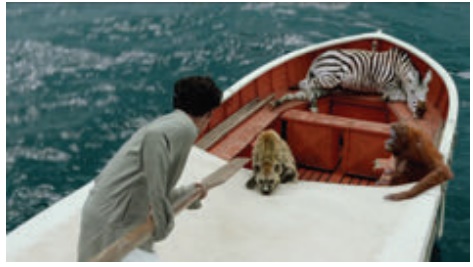
Richard Parker also explained the animals’ strange behavior. Now it was clear why the hyena had confined itself to such an absurdly small space behind the zebra and why it had waited so long before killing it. It was fear of the greater beast and fear of touching the greater beast’s food. The strained, temporary peace between Orange Juice and the hyena, and my reprieve, were no doubt due to the same reason: in the face of such a superior predator, all of us were prey, and normal ways of preying were affected. It seemed the presence of a tiger had saved me from a hyena— surely a textbook example of jumping from the frying pan into the fire.
But the great beast was not behaving like a great beast, to such an extent that the hyena had taken liberties. Richard Parker’s passivity, and for three long days, needed explaining. Only in two ways could I account for it: sedation and seasickness. Father regularly sedated a number of the animals to lessen their stress. Might he have sedated Richard Parker shortly before the ship sank? Had the shock of the shipwreck–the noises, the falling into the sea, the terrible struggle to swim to the lifeboat–increased the effect of the sedative? Had seasickness taken over after that? These were the onlyplausible explanations I could come up with. I lost interest in the question. Only water interested me.
I took stock of the lifeboat. It was three–and–a half feet deep, eight feet wide and twenty-six feet long, exactly. I know because it was printed on one of the side benches in black letters. It also said that the lifeboat was designed to accommodate a maximum of thirty-two people. Wouldn’t that have been merry, sharing it with so many? Instead we were three and it was awfully crowded.
It seems orange is the color of survival because the whole inside of the boat and the tarpaulin and the life jackets and the lifebuoy and the oars and most every other significant object aboard was orange. Even the plastic, headless whistles were orange.
The words Tsimtsum and Panama were printed on each side of the bow in stark, black, roman capitals. I did not grasp all these details — and many more — right away. They came to my notice with time and as a result of necessity. I would be in the direst of dire straits, facing a bleak future, when some small thing, some detail, would transform itself and appear in my mind in a new light. It would no longer be the small thing it was before, but the most important thing in the world, the thing that would save my life. This happened time and again. How true it is that necessity is the mother of invention, how very true.
And what if the supplies were at the bow, beneath the tarpaulin? I turned and crawled back. I felt like a dried-out lizard. I pushed down on the tarpaulin. It was tautly stretched. If I unrolled it, I would give myself access to what supplies might be stored below. But that meant creating an opening onto Richard Parker’s den.
There was no question. Thirst pushed me on. I unrolled it a little. Immediately I was rewarded. The bow was like the stern; it had an end bench. And upon it, just a few inches from the stem, a hasp glittered like a diamond. There was the outline of a lid. My heart began to pound. I unrolled the tarpaulin further. I peeked under. The lid was shaped like a rounded-out triangle, three feet wide and two feet deep. At that moment I perceived an orange mass. I jerked my head back. But the orange wasn’t moving and didn’t look right. I looked again. It wasn’t a tiger. It was a life jacket. There were a number of life jackets at the back of Richard Parker’s den.
A shiver went through my body. Between the life jackets, partially, as if through some leaves, I had my first, unambiguous, clear- headed glimpse of Richard Parker. It was his haunches I could see, and part of his back. Tawny, striped and simply enormous. He was facing the stern, lying flat on his stomach. He was still except for the breathing motion of his sides. I blinked in disbelief at how close he was. He was right there, two feet beneath me. Stretching, I could have pinched his bottom. And between us there was nothing but a thin tarpaulin, easily got round.
“God preserve me!” No supplication was ever more passionate yet more gently carried by the breath. I lay absolutely motionless. I had to have water, I brought my hand down and quietly undid the hasp. I pulled on the lid. It opened onto a locker, I looked down between my legs. I thought I would faint for joy. The open locker glistened with shiny new things. Oh, the delight of the manufactured good, the man-made device, the created thing! That moment of material revelation brought an intensity of pleasure – a heady mix of hope, surprise, disbelief, thrill, gratitude, all crushed into one – unequalled in my life by any Christmas, birthday, wedding, Diwali or other gift-giving occasion. I was positively giddy with happiness.
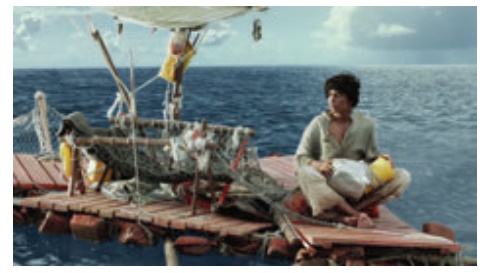
My eyes immediately fell upon what I was looking for. Whether in a bottle, a tin can or a carton, water is unmistakably packaged. On this lifeboat, the wine of life was served in pale golden cans that fit nicely in the hand. 'Drinking Water' said the vintage label in black letters. HP Foods Ltd. were the vintners. 500 ml were the contents. There were stacks of these cans, too many to count at a glance.
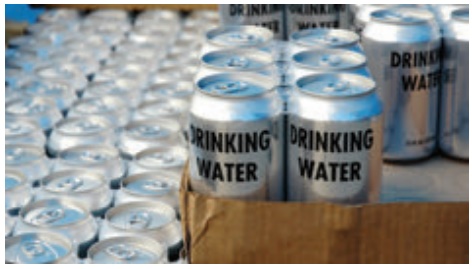
With a shaking hand I reached down and picked one up. It was cool to the touch and heavy. I shook it. The bubble of air inside made a dull glub glub glub sound. I was about to be delivered from my hellish thirst. My pulse raced at the thought. I only had to open the can. I paused. How would I do that?
I had a can – surely I had a can opener? I looked in the locker. There was a great quantity of things. I rummaged about. I was losing patience. Aching expectation had run its fruitful course. I had to drink now – or I would die. I could not find the desired instrument. But there was no time for useless distress. Action was needed. Could I prise it open with my fingernails? I tried. I couldn’t. My teeth? It wasn’t worth trying. I looked over the gunnel. The tarpaulin hooks. Short, blunt, solid. I kneeled on the bench and leaned over. Holding the can with both my hands, I sharply brought it up against a hook. A good dint. I did it again. Another dint next to the first. By dint of dinting, I managed the trick. A pearl of water appeared. I licked it off. I turned the can and banged the opposite side of the top against the hook to make another hole. I worked like a fiend. I made a larger hole. I sat back on the gunnel. I held the can up to my face. I opened my mouth. I tilted the can.
My feelings can perhaps be imagined, but they can hardly be described. To the gurgling beat of my greedy throat, pure, delicious, beautiful, crystalline water flowed into my system. Liquid life, it was. I drained that golden cup to the very last drop, sucking at the hole to catch any remaining moisture. I went, “Ahhhhhh!” tossed the can overboard and got another one. I opened it the way I had the first and its contents vanished just as quickly. That can sailed overboard too, and I opened the next one. Which, shortly, also ended up in the ocean. Another can was dispatched. I drank four cans, two liters of that most exquisite of nectars, before I stopped. You might think such a rapid intake of water after prolonged thirst might upset my system. Nonsense! I never felt better in my life. Why, feel my brow! My forehead was wet with fresh, clean, refreshing perspiration. Everything in me, right down to the pores of my skin, was expressing joy.
A sense of well–being quickly overcame me. My mouth became moist and soft. I forgot about the back of my throat. My skin relaxed. My joints moved with greater ease. My heart began to beat like a merry drum and blood started flowing through my veins like cars from a wedding party honking their way through town. Strength and suppleness came back to my muscles. My head became clearer. Truly, I was coming back to life from the dead. It was glorious. I tell you to be drunk on alcohol is disgraceful, but to be drunk on water is noble and ecstatic basked in bliss and plenitude for several minutes.
I had water rations to last me 124 days. Never had simple arithmetic brought such a smile to my face. It was Richard Parker who calmed me down. It is the irony of this story that the one who scared me witless to start with was the very same who brought me peace, purpose, I dare say even wholeness.
I had to tame him. It was at that moment that I realized this necessity. It was not a question of him or me, but of him and me. We were, literally and figuratively, in the same boat. We would live – or we would die – together. He might be killed in an accident, or he could die shortly of natural causes, but it would be foolish to count on such an eventuality. More likely the worst would happen: the simple passage of time, in which his animal toughness would easily outlast my human frailty. Only if I tamed him could I possibly trick him into dying first, if we had to come to that sorry business.
But there’s more to it. I will come clean. I will tell you a secret: a part of me was glad about Richard Parker. A part of me did not want Richard Parker to die at all, because if he died I would be left alone with despair, a foe even more formidable than a tiger. If I still had the will to live, it was thanks to Richard Parker. He kept me from thinking too much about my family and my tragic circumstances. He pushed me to go on living. I hated him for it, yet at the same time I was grateful. I am grateful. It’s the plain truth: without Richard Parker, I wouldn’t be alive today to tell you my story.
I left Richard Parker in a jungle and waited for a ship. It pained me to see the animal without even turning his head to have a last glimpse. A ship did find me and I am now reunited with my family.
About The Author
Yann Martel was born in Spain to French Canadian parents. Martel’s father worked as a diplomat and the family moved to Costa Rica, France, Mexico and Canada during Martel’s childhood. He grew up speaking both French and English.

Martel studied philosophy at Trent University in Ontario, and later spent a year in India visiting religious sisters and zoos. His first three books received little critical or popular attention but with the publication of Life of Pi in 2001, Martel became internationally famous and he was awarded the Man Booker Prize in 2002.
Related Topics